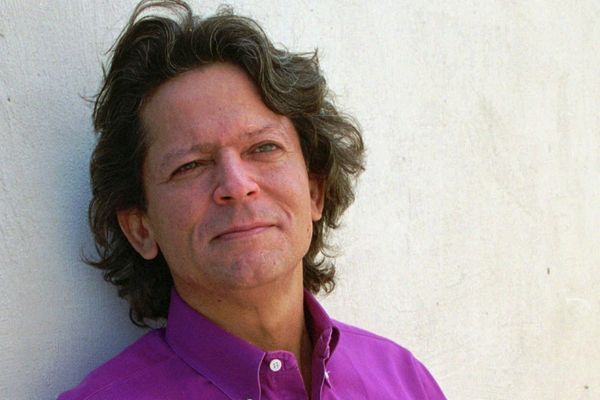
Earlier this month, as Kellyanne Conway held a party for her largely pro-Trump book, Here’s the Deal, at a Washington, D.C. restaurant, her husband George — a never-Trump Republican and co-founder of the Lincoln Project — was trashing the former president on MSNBC and CNN. Many in Washington noted George’s absence, POLITICO Playbook observed, particularly because Café Milano, the book party venue, features two large TV screens that usually play cable news, all but ensuring his counterprogramming would be seen by partygoers.
The Conways have been famously divided since Trump took office, and Kellyanne’s book airs some of her marital frustration in the open: “I was looking at the possibility,” she writes, “that the man who always had my back might one day stab me in it.” (She also revealed last month that while the Conways are still married, they are not living together.)
But in an age of hyper-partisan politics and toxic social media, the Conways’ battles don’t feel so far from many Americans’ everyday lives. George and Kellyanne might have been split apart by the polarization within the Republican Party, but that same force is probably even stronger for couples in opposing political parties. Was George’s attack on his wife’s professional accomplishment a new low for scorched-Earth intrafamily politics, or just another day in a divided nation?
Jeanne Safer is a psychoanalyst and the author of the 2019 book I Love You, But I Hate Your Politics: How to Protect Your Intimate Relationships in a Poisonous, Partisan World. She is also a therapist who has been in private practice for over 45 years.
She frequently speaks about her own mixed political marriage, as a liberal wed to Richard Brookhiser, a senior editor of The National Review and a protégé of William F. Buckley Jr. Partnerships like theirs are increasingly rare: In a 2017 survey of 1,000 people conducted by the University of California, Santa Barbara, only 88 reported being married to someone who hadn’t voted for the same presidential candidate. We talked about the advantages of a mixed political household, the challenge of accepting what can’t be changed and the reason Trump has made it hard for her to take her own advice.
This interview was edited for length and clarity.

Joanna Weiss: Let’s start with Kellyanne and George Conway, the divided couple of the moment, and the counterprogramming George did during Kellyanne’s book party.
Unpack what you think was going on there.
Jeanne Safer: A concept from psychoanalysis is that there’s “manifest content” and there’s “latent content.” Manifest content is what it looks like on the surface, and latent content is what’s really going on. Probably they were jealous of each other. But if one person is having a party, the other one decides to have an opposite party? That is so hostile. This isn’t about beliefs. This is about being a jerk.
Weiss: I came into my own political awareness in the 1990s with Bill Clinton adviser James Carville and George Bush aide Mary Matalin, who had a kind of traveling strange-bedfellows road show. Knowing their shtick always made me wonder whether the Conways were just putting on an act — whether they were kicking back at the end of the day with a martini and clinking their glasses together and saying, “Good for us.”
Safer: It’s so hard to know, when people are on TV, what the hell are they really about? But I think what you look at is the interaction between people, not about politics, how they talk to each other. [My husband and I] have done a fair amount of TV on this topic — like, how can you stand each other? — and somebody saw one of the programs and used it to teach people how to shut up and let the other person talk. They said, “Look how she says something, and look how he listens and doesn’t interrupt.” I thought that was the biggest compliment I ever got.
Weiss: Isn’t it mutually beneficial for the Conways, in some ways, to have this public dispute? They get more attention because of the marital intrigue, beyond just the substance of an op-ed.
Safer: I don’t like to listen to people fight that way. But I’m in the minority.
Weiss: Political fighting is kind of entertainment in our culture.
Safer: It is. The point is, if you’re trying to have a conversation with somebody who you know disagrees with you, you have to be actually interested in what they have to say, not in changing their mind. Changing a person’s mind — you may as well shoot yourself, you’re never going to accomplish it. Never, ever, ever. And we need that to be our premise.
Weiss: When Carville and Matalin were very much in the public eye, they seemed to be having fun.
Safer: If you can do that and you both are hams like that and you’re comfortable in the media, go to it. That’s fine. I don’t think there was a lot of real understanding that came across. I don’t think anybody learned anything from listening to [Carville and Matalin] fight.
Weiss: Did you expect that your political differences would be a challenge in your own marriage?
Safer: By my telling you how we met, you’ll understand the rest. We met in a group in New York City that sings Renaissance religious music on street corners. Neither of us is religious, but we’re both singers. I was in it for seven years and at some point, Rick joined. He had a wonderful voice and lovely blue eyes. He was six feet tall. He was William F. Buckley’s protégé. We’ve been married for 42 years.
Weiss: Wow. It’s working.
Safer: My parents, I don’t think, ever voted for the same person. My father was a Republican, my mother was a Democrat. And they talked about politics, but they didn’t come to blows about it.
Weiss: So why doesn’t that happen anymore?
Safer: I think politics has, at this point, almost completely taken the role of religion.
Weiss: Meaning that today, your political beliefs are articles of faith for you.
Safer: Yeah. And that makes it much more dangerous to try to have an argument with somebody about it because you’re talking about their core beliefs. So I tread very, very lightly.
Weiss: Do you ever talk about politics at home?
Safer: What my husband and I have figured out how to do is to talk about it on a different level. We don’t talk about who we’re going to vote for — I know we’re going to cross out each other’s votes eventually. We talk about: “What do you think of this person?” You could say, “I read that Trump said such-and-such, what do you think about that?” But you have to do it really wanting to know what the other person thinks, not trying to change their mind.
Weiss: You write about this in your book: How politically-opposite couples can’t resist fighting “an interminable battle to change the other person’s mind, a campaign that has no beginning, no end, and from which they cannot extricate themselves.” Why is it so reflexive for people to have that same fight?
Safer: In a way, we can’t stand not to have somebody that we care about be us. It really takes effort to think, “This is a separate person.” I made up a word: “article-thrusting.” It’s “Here, read this!” and you stick it in their face. I know a couple in our building: The guy, he’s a Trump supporter. He had known Trump a little bit and had good business dealings with him. [The wife,] she’s a lefty. Every day, she put an article on her husband’s breakfast plate about her side of things. This is what you should never do. And this is what everybody does. “Read this!”
Weiss: Is there ever a circumstance where you should try to change your partner’s mind?
Safer: I think that is totally insane. People don’t want their minds changed by you. If somebody’s mind is going to be changed, they’re the ones that are going to do it, and the more you try, the bigger problems you have.
Weiss: How do you handle disputes between your husband and your liberal friends?
Safer: A thousand years ago, we went to a party of all psychoanalysts. Somebody walks up to me and says, “What’s it like to be married to a crypto-Nazi?” I said, “How dare you talk about my husband that way? These are serious words.” And the person was kind of taken aback. I think it’s your duty with a friend or a spouse to support them, particularly if the person who’s being obnoxious is on your side.
Weiss: Is Donald Trump an extreme example of this old problem, or has he introduced something new to the landscape? The Conways are both Republicans, after all; it’s Trump who has divided them.
Safer: I’m not sure. He gets me in a certain way that makes me violent, infuriated, because I think he’s dangerous.
Weiss: So have you found yourself struggling to take your own advice in conversations about Trump? Sometimes I wonder if today, with political disputes brimming on the surface, it is as difficult to not talk about politics as it is to talk about it.
Safer: Absolutely. But I think adults are supposed to have some self-restraint and self-awareness. And to know that if you get into that, that’s gonna be hell on Earth.
Weiss: There are people, particularly on the left, who would argue that if some group or person is being disparaged — if somebody says something that can be perceived as racist, for instance — that it’s a person’s obligation to point it out.
Safer: First of all, do you think, if somebody is a racist, what you’re going to say is going to change their mind? Forget it! I might say, “That disturbs me to hear because I don’t think it’s fair or right.” But I’d say it with the tone I’m using with you.
Weiss: You sound so calm when you say that. Why it so hard to have calm conversations?
Safer: I think one of the things that’s very sad is the tiny number of people who even have friends and acquaintances across the aisle. It’s unbelievably small. I mean, how many people do you know who are passionate Democrats, who have one friend who’s a Republican? One person, maybe. Two people? Nobody. They’re separate worlds.
Weiss: So you’re saying that people aren’t building up those skills because they’re never in those circumstances.
Safer: And if they are in them, they’re antagonistic.
Weiss: Do you have any friends who are Trump supporters?
Safer: Probably I do. But they haven’t told me about it. And that’s just fine with me.
Weiss: What about your husband? What if your husband came home one day and said, “You know what? I voted for Donald Trump.”
Safer: I cannot conceive of that in a million years. If he had been a Trump supporter, he wouldn’t be my husband, because somebody who would really like Trump would be unlikely to like me. We’ve actually been very lucky that way: I don’t know which of us can’t stand Trump more.
Weiss: But what if he did vote for Trump?
Safer: I would figure out a way. I’m not going to let a 42-year marriage be destroyed by Donald Trump, for god’s sake! The most important thing in a marriage is what I learned, the hard way, to call the chemotherapy test. When you’re lying in a bed getting chemotherapy, which happened to both of us 10 years ago, who shows up to take care of you? And if it’s from the opposite side, then you know that politics doesn’t mean a damn in terms of human relations.
Weiss: Would a Trump supporter be able to pass the chemotherapy test with you?
Safer: It depends. If they were a Trump supporter and they also showed up for me, that counts more than who you voted for.
Weiss: What would you tell the Conways if they were sitting on your couch today? How could they repair their relationship?
Safer: They have to want to. We can’t talk about what people can do to repair until we know whether they want to repair it — or if what they want to do is fight like hell for the rest of their lives. To me, every couple has major disagreements. I don’t know why we decided that politics is the only one that counts.
Weiss: Maybe it’s because today people think of politics as proxy for values.
Safer: I think we’re so wrong, thinking politics is character. Sometimes it is, but I sure wouldn’t want to make that my main assumption about a person.
Weiss: We’re eight years into the Trump era. Is people’s ability to accept their loved ones’ politics getting better or worse?
Safer: I think it’s getting constantly worse because we spend no time with people we disagree with. Less and less time. It’s tragic.
Weiss: So should we all be getting hobbies that have nothing to do with politics?
Safer: I think it’s a great idea. It worked for me.








